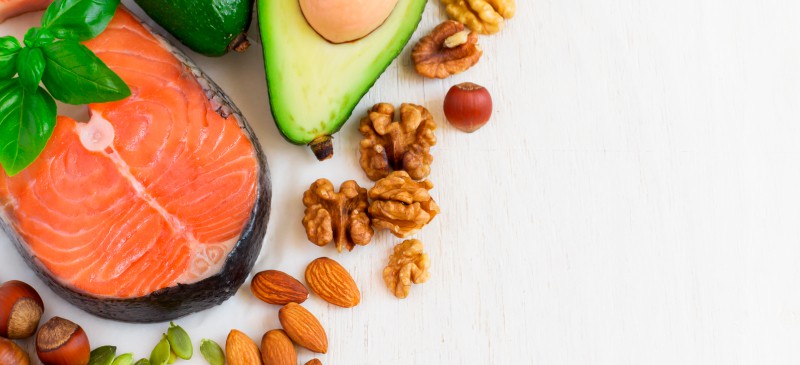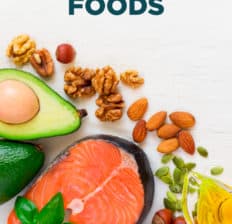This Dr. Axe content is medically reviewed or fact checked to ensure factually accurate information.
With strict editorial sourcing guidelines, we only link to academic research institutions, reputable media sites and, when research is available, medically peer-reviewed studies. Note that the numbers in parentheses (1, 2, etc.) are clickable links to these studies.
The information in our articles is NOT intended to replace a one-on-one relationship with a qualified health care professional and is not intended as medical advice.
This article is based on scientific evidence, written by experts and fact checked by our trained editorial staff. Note that the numbers in parentheses (1, 2, etc.) are clickable links to medically peer-reviewed studies.
Our team includes licensed nutritionists and dietitians, certified health education specialists, as well as certified strength and conditioning specialists, personal trainers and corrective exercise specialists. Our team aims to be not only thorough with its research, but also objective and unbiased.
The information in our articles is NOT intended to replace a one-on-one relationship with a qualified health care professional and is not intended as medical advice.
Best Vitamin B Foods, Plus Their Health Benefits + Recipes
October 10, 2021

If you’re experiencing low energy, brain fog, trouble concentrating and mood changes, you may not be getting enough vitamin B foods in your diet.
There are eight forms of vitamin B, and all of them play a role in everyday body functions. Fortunately, the best vitamin B foods boast many of these forms in healthy amounts, promoting heart and brain health, while boosting better energy and mood.
Adding just one serving of a vitamin B-rich food to your daily diet can help you avoid deficiency and provide many other macro and micronutrients, too.
Best Vitamin B Foods
There are many foods that feature several B vitamins, making them the top choices for supporting brain function, healthy metabolism, healthy energy levels and healthy development.
The eight types of B vitamins that you want to find in your foods include:
- B1 (thiamine)
- B2 (riboflavin)
- B3 (niacin)
- B5 (pantothenic acid)
- B6 (pyridoxine)
- B7 (biotin)
- B9 (folate or folic acid)
- B12 (cobalamin)
The best B vitamin foods include several of these forms, serving as an excellent tool for boosting energy, promoting proper development, supporting eye health and brain function, and enhancing cardiovascular health.
Here’s a rundown of a vitamin B food list:
1. Liver
While you may not think of liver as a superfood, but this organ meat is jam-packed with essential nutrients, including B vitamins. Liver is especially high in vitamin B12, which plays a role in red blood cell formation and improves cellular function, metabolism and brain health.
In addition to providing about 79 percent of your recommended daily value for B12, chicken liver features folate, vitamin B5, vitamin B2, vitamin B3 and vitamin B6.
2. Avocado
Want to get a healthy serving of monounsaturated fats and micronutrients? Adding avocado to a meal provides a boost of several vitamins and minerals, including folate, vitamin B6, niacin, riboflavin and pantothenic acid. The superfood also features a good portion of fiber, vitamin K, potassium and magnesium.
That’s exactly why studies show that avocado consumption is associated with better diet and quality nutrient intake.
3. Wild-Caught Salmon
Wild-caught salmon is an excellent source of niacin, vitamin B12, vitamin B6, riboflavin, thiamine, pantothenic acid and folate. In addition to being one of the top vitamin B foods, salmon also contains healthy amounts of selenium, potassium, magnesium, iron and zinc, and it’s a source of heart-healthy fats and protein.
Thanks for its impressive nutrition profile, studies indicate that daily consumption of salmon improves traditional risk predictors of cardiovascular disease in obese participants compared to non-fish eaters.
4. Grass-Fed Beef
Perhaps most known for its conjugated linoleic acid content, grass-fed beef serves as a potential cancer fighter that helps reduce the risk of heart disease and improve blood sugar levels, which has been shown in several studies.
Grass-fed beef is also an excellent vitamin B food that boasts over 70 percent of your recommended daily value for niacin and vitamin B6. It also contains vitamin B12, vitamin B5, thiamine and folate.
5. Organic, Free-Range Chicken
Free-range chicken is a healthy form of protein, with one breast supplying around 52 percent of most people’s daily protein needs. Research proves that consumption of high-quality proteins is essential for optional growth, development and human health.
Chicken also provides over half of your daily needs for niacin and is a great source of vitamin B6, vitamin B12, folic acid and pantothenic acid.
6. Lentils
Lentils have been consumed for thousands of years as a healthy meat substitute that’s rich in protein and essential nutrients. Considered a top “functional food,” lentils provide minerals, polyphenols, fiber and other bioactive compounds.
A cup of cooked lentils boasts over 90 percent of your daily value of folate, plus a good amount of thiamine, vitamin B6, pantothenic acid, niacin and riboflavin.
Lentils are also a great source of fiber, boost heart health and help manage blood sugar levels.
7. Pinto Beans
Pinto beans are rich in polyphenols, which are known for their ability to reduce inflammation and fight oxidative stress. Pinto beans also provide a slew of macronutrients and micronutrients, including protein, fiber and over 200 percent of your daily needs of folate.
Other B vitamins found in pinto beans are thiamine, vitamin B6, riboflavin and niacin.
8. Sunflower Seeds
Sunflower seeds are among the best vitamin B foods because of their thiamine, vitamin B6, folate, niacin and riboflavin content. They’re also excellent sources of vitamin E, manganese, copper and selenium and contain healthy fats and a good amount of dietary fiber.
Eating sunflower seeds can help balance blood sugar levels, combat bone loss and muscle cramps, support thyroid function, and reduce the risk of heart disease. Research suggests that these health benefits are directly related to sunflower seeds nutrition, including its micronutrient and antioxidant content.
9. Almonds
Almonds are rich in fiber, unsaturated fatty acids and protective antioxidants. They provide plant-based protein and can even reduce hunger, making them the perfect healthy snack.
In addition to these benefits, almonds are a great source of riboflavin, niacin and folate, in addition to their vitamin E, manganese, magnesium, phosphorus and calcium content.
Studies have found that consuming almonds can help improve cholesterol levels, control blood sugar levels, aid weight loss and increase nutrient absorption.
10. Eggs
Eating organic, free-range eggs is an easy way to boost your nutrient intake. They contain healthy fats, including omega-3 fatty acids, protein, vitamin A, vitamin E and beta-carotene.
Eggs also provide a whole lot of vitamin B12, folate and riboflavin.
Studies indicate that consuming up to one egg per day is associated with a potentially lower cardiovascular risk. Plus, eggs help you to feel full and can help aid weight loss and boost brain function.
11. Nutritional Yeast
Nutritional yeast is grown on mixtures of cane and beet molasses after the fermentation process. It can be used in soup and sauce recipes to enhance the taste and texture, giving it a somewhat cheesy flavor.
The best thing, however, about nutritional yeast is its impressive nutrition profile. It’s packed with fiber, protein and B vitamins.
Nutritional yeast provides over 100 percent the recommended daily value for thiamine, riboflavin, vitamin B6 and vitamin B12. It’s basically a vitamin B complex in food form!
Add one to two tablespoons of nutritional yeast to a meal and you’ll getting a healthy dose of B vitamins, plus zinc, magnesium and more.
12. Durian Fruit
Durian is an exotic tropical fruit that’s harvested primarily in Southeast Asian countries. It can be eaten both raw or cooked and has a strong, signature smell. Durian fruits are greenish-brown in color, usually pretty large (although not as big as jackfruits) and have a spiky exterior.
In addition to being edible, it’s also considered a potential therapeutic agent due to its valuable nutritional composition and presence of bioactive compounds. It’s also very high B vitamins, including thiamine, vitamin B6 and riboflavin.
Nutrition Facts
Durian is considered by experts to be a very nutrient-dense fruit — particularly high in vitamin C, B vitamins (including thiamine, vitamin B6 and riboflavin), manganese and potassium. Unusually, it’s a fruit that contains fat. As a result, it’s higher in calories than most fruits, similar to avocado.
Durian also contains some protein, another unusual feature of a fruit. Overall it’s a very balanced food, providing fiber, fat, protein and carbs all in one package.
Recipes
Now you’re aware of the best foods rich in vitamin B, but how do you get them into your daily diet? Here are some vitamin B foods recipe ideas to get you started.
Remember, just adding a serving of one or two of these foods goes a long way, as many of them provide almost a full daily dose of these important micronutrients.
Risks and Side Effects
While it’s important to maintain healthy levels of B vitamins, stick to levels that don’t significantly exceed the recommended daily values. Consuming too much of anything can lead to adverse effects, which may include upset stomach and diarrhea.
Pay attention to serving sizes when eating these vitamin B foods. Some, like avocado and almonds, are higher in calories but provide a nutritional punch, so you only need small amounts.
As always, when adding something new into your diet, take it slow. Give your body time to adjust.
Conclusion
- Why do we need to eat foods with vitamin B? The eight forms of vitamin B are vital for several body functions, including cell health, the growth of red blood cells, healthy energy levels, cognitive function, healthy digestion and proper nerve function.
- You can maintain healthy levels of B vitamins by eating foods that provide the micronutrients naturally. This includes high-quality meats, like grass-fed beef and wild-caught salmon, eggs, almonds, sunflower seeds and nutritional yeast.





